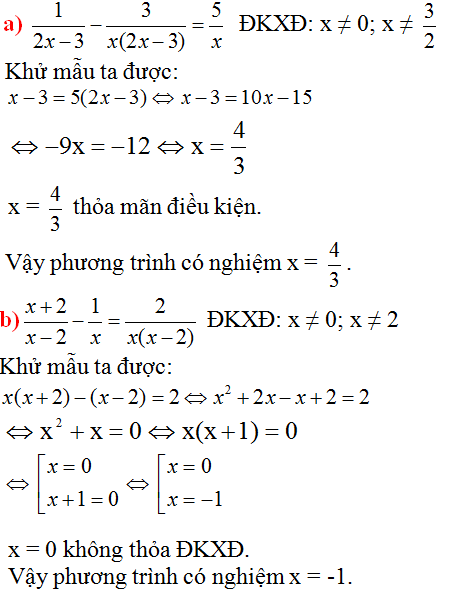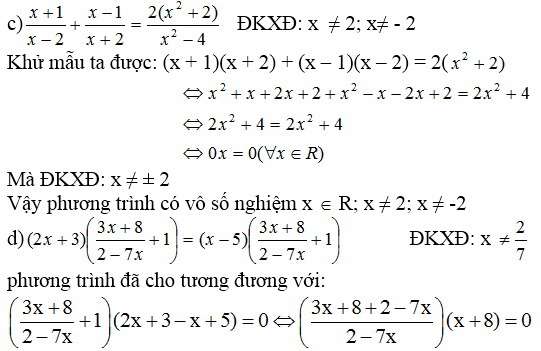Hãy nhập câu hỏi của bạn vào đây, nếu là tài khoản VIP, bạn sẽ được ưu tiên trả lời.

\(a,\left(2x^2+1\right)+4x>2x\left(x-2\right)\)
\(\Leftrightarrow2x^2+1+4x>2x^2-4x\)
\(\Leftrightarrow4x+4x>-1\)
\(\Leftrightarrow8x>-1\)
\(\Leftrightarrow x>-\frac{1}{8}\)
\(b,\left(4x+3\right)\left(x-1\right)< 6x^2-x+1\)
\(\Leftrightarrow4x^2-4x+3x-3< 6x^2-x+1\)
\(\Leftrightarrow4x^2-x-3< 6x^2-x+1\)
\(\Leftrightarrow4x^2-6x^2< 1+3\)
\(\Leftrightarrow-2x^2< 4\)
\(\Leftrightarrow x^2>2\)
\(\Leftrightarrow x>\pm\sqrt{2}\)

a) \(\frac{5-x}{4x^2-8x}\) + \(\frac{7}{8x}\) = \(\frac{x-1}{2x\left(x-2\right)}\) +\(\frac{1}{8x-16}\) ĐKXĐ : x #0, x#2, x#-2
<=> \(\frac{5-x}{4x\left(x-2\right)}\) + \(\frac{7}{8x}=\frac{x-1}{2x\left(x-2\right)}\) + \(\frac{1}{8\left(x-2\right)}\)
<=> \(\frac{2\left(5-x\right)}{8x\left(x-2\right)}+\frac{7\left(x-2\right)}{8x\left(x-2\right)}=\frac{4\left(x-1\right)}{8x\left(x-2\right)}+\frac{x}{8x\left(x-2\right)}\)
=> 10 - 2x + 7x - 14 = 4x - 4 + x
<=>-2x + 7x - 4x + x = -4 - 10 + 14
<=>x=-14

b)\(\dfrac{x+14}{86}+\dfrac{x+15}{85}+\dfrac{x+16}{84}+\dfrac{x+17}{83}+\dfrac{x+116}{4}=0\)
\(\Leftrightarrow\dfrac{x+14}{86}+1+\dfrac{x+15}{85}+1+\dfrac{x+16}{84}+1+\dfrac{x+17}{83}+1+\dfrac{x+116}{4}-4=0\)
\(\Leftrightarrow\dfrac{x+100}{86}+\dfrac{x+100}{85}+\dfrac{x+100}{84}+\dfrac{x+100}{83}+\dfrac{x+100}{4}=0\)
\(\Leftrightarrow\left(x+100\right)\left(\dfrac{1}{86}+\dfrac{1}{85}+\dfrac{1}{84}+\dfrac{1}{83}+\dfrac{1}{4}\right)=0\)
\(\Leftrightarrow x+100=0\).Do \(\dfrac{1}{86}+\dfrac{1}{85}+\dfrac{1}{84}+\dfrac{1}{83}+\dfrac{1}{4}\ne0\)
\(\Leftrightarrow x=-100\)
c)\(\dfrac{1}{\left(x^2+5\right)\left(x^2+4\right)}+\dfrac{1}{\left(x^2+4\right)\left(x^2+3\right)}+\dfrac{1}{\left(x^2+3\right)\left(x^2+2\right)}+\dfrac{1}{\left(x^2+2\right)\left(x^2+1\right)}=-1\)
\(\Leftrightarrow\dfrac{1}{\left(x^2+1\right)\left(x^2+2\right)}+\dfrac{1}{\left(x^2+2\right)\left(x^2+3\right)}+...+\dfrac{1}{\left(x^2+4\right)\left(x^2+5\right)}=-1\)
\(\Leftrightarrow\dfrac{1}{x^2+1}-\dfrac{1}{x^2+2}+\dfrac{1}{x^2+2}-\dfrac{1}{x^2+3}+...+\dfrac{1}{x^2+4}-\dfrac{1}{x^2+5}=-1\)
\(\Leftrightarrow\dfrac{1}{x^2+1}-\dfrac{1}{x^2+5}=-1\)\(\Leftrightarrow\dfrac{4}{x^4+6x^2+5}=-1\)
\(\Leftrightarrow\dfrac{x^4+6x^2+9}{x^4+6x^2+5}=0\Leftrightarrow x^4+6x^2+9=0\)
\(\Leftrightarrow\left(x^2+3\right)^2>0\forall x\) (vô nghiệm)

a) 1x−1−3x2x3−1=2xx2+x+11x−1−3x2x3−1=2xx2+x+1
Ta có: x3−1=(x−1)(x2+x+1)x3−1=(x−1)(x2+x+1)
=(x−1)[(x+12)2+34]=(x−1)[(x+12)2+34] cho nên x3 – 1 ≠ 0 khi x – 1 ≠ 0⇔ x ≠ 1
Vậy ĐKXĐ: x ≠ 1
Khử mẫu ta được:
x2+

a) Đk : \(x\ne0;\ne1\)
\(\dfrac{x+3}{x+1}+\dfrac{x-2}{x}=\dfrac{2\left(x^2+x-1\right)}{x\left(x+1\right)}\)
\(\Rightarrow\dfrac{x^2+3x}{x\left(x+1\right)}+\dfrac{x^2-x-2}{x\left(x+1\right)}-\dfrac{2x^2+2x-2}{x\left(x+1\right)}=0\)
\(\Rightarrow\dfrac{x^2+3x+x^2-x-2-2x^2-2x+2}{x\left(x-1\right)}=0\)
\(\Rightarrow\dfrac{0}{x-1}=0\)
=> Phương trình có vô số nghiệm x
b) Đk : \(x\ne2;x\ne3\)
\(\dfrac{2}{x-2}-\dfrac{x}{x+3}=\dfrac{5x}{\left(x-2\right)\left(x+3\right)}-1\)
\(\Rightarrow\dfrac{2x+6}{\left(x-2\right)\left(x+3\right)}-\dfrac{x^2-2x}{\left(x-2\right)\left(x+3\right)}-\dfrac{5x}{\left(x-2\right)\left(x+3\right)}+\dfrac{x^2+x-6}{\left(x-2\right)\left(x+3\right)}\)
=0
\(\Rightarrow\dfrac{2x+6-x^2+2x-5x+x^2+x+6}{\left(x-2\right)\left(x+3\right)}=0\)
\(\Rightarrow\dfrac{12}{\left(x-2\right)\left(x+3\right)}=0\)
=> Phương trình vô nghiệm
c)
\(\Leftrightarrow\dfrac{x^2-x+1}{x^4+x^2+1}-\dfrac{x^2+x+1}{x^4+x^2+1}-\dfrac{1-2x}{x^4+x^2+1}=0\)
\(\Rightarrow\dfrac{x^2-x+1-x^2-x-1-1+2x}{x^4+x^2+1}=0\)
\(\Rightarrow\dfrac{-1}{x^4+x^2+1}=0\)
=> PTVN
d) Thôi tự làm đi, câu này dễ :Vvv
e)
\(\left(x+1\right)\left(x+2\right)\left(x+4\right)\left(x+5\right)\)=40
\(\Rightarrow\left[\left(x+1\right)\left(x+5\right)\right]\cdot\left[\left(x+2\right)\left(x+4\right)\right]=40\)
\(\Rightarrow\left(x^2+6x+5\right)\left(x^2+6x+8\right)=40\)
Đặt
\(x^2+6x+7=t\)
Phương trình tương đương
\(\left(t-1\right)\left(t+1\right)=40\)
\(t^2=41\)
\(\)\(t=\pm\sqrt{41}\)
Thay vào tìm x.

a: \(\Leftrightarrow1-x+3x+3=2x+3\)
=>2x+4=2x+3(vô lý)
b: \(\Leftrightarrow\left(x+2\right)^2-2x+3=x^2+10\)
\(\Leftrightarrow x^2+4x+4-2x+3=x^2+10\)
=>4x+7=10
hay x=3/4
d: \(\Leftrightarrow\left(-2x+5\right)\left(3x-1\right)+3\left(x-1\right)\left(x+1\right)=\left(x+2\right)\left(1-3x\right)\)
\(\Leftrightarrow-6x^2+2x+15x-5+3\left(x^2-1\right)=\left(x+2\right)\left(1-3x\right)\)
\(\Leftrightarrow-6x^2+17x-5+3x^2-3=x-3x^2+2-6x\)
\(\Leftrightarrow-3x^2+17x-8=-3x^2-5x+2\)
=>22x=10
hay x=5/11



\(\dfrac{x\left(3-x\right)\left(x^2+3\right)}{\left(x+1\right)^2}=2\)
<=> \(\dfrac{\left(3x-x^2\right)\left(x^2+3\right)}{x^2+2x+1}-2=0\)
<=> \(\dfrac{3x^3+9x-x^4-3x^2}{x^2+2x+1}-\dfrac{2\left(x^2+2x+1\right)}{x^2+2x+1}=0\)
=> 3x3 + 9x - x4 - 3x2 - 2x2 - 4x - 2 = 0
<=> - x4 + 3x3 - 5x2 + 5x - 2 = 0
<=> - x4 + x3 - 2x2 + 2x3 - 2x2 + 4x - x^2 + x - 2 = 0
<=> - x2(x2 - x + 2) + 2x(x2 - x + 2) - (x2 - x + 2) = 0
<=> (x2 - x + 2)(- x2 + 2x - 1) = 0
<=> - (x - 1)2(x2 - x + 2) = 0
<=> x = 1 (vì x2 - x + 2 \(\ge\) 1,75 > 0)
Vậy S = {1}
b/ \(2x+\dfrac{49}{2x+1}\le13\)
\(\Leftrightarrow\dfrac{x^2-6x+9}{2x+1}\le0\)
Vì \(x^2-6x+9=\left(x-3\right)^2\ge0\) nên
\(\Leftrightarrow2x+1\le0\)
\(\Leftrightarrow x\le-\dfrac{1}{2}\)